After days of negotiations and uncertainty, the draft text was quickly approved this morning at COP28.
Thank you for joining us for our live coverage of COP28.
 ADVERTISEMENT
ADVERTISEMENT
 ADVERTISEMENT
ADVERTISEMENT

 ${title}
${title}
Live ended
‘You did it’ COP28 President tells delegates
The gavel has officially gone down on the closing plenary at COP28 in Dubai, to cheers from the room.
“I must say, that you did it: you delivered” Sultan Al Jaber told delegates, “this is a true victory of multilateralism.”
Prior to the close of the conference just after 5pm GST - a cool 23 hours over time - observers had a chance to make their statements. Not all thought that the job had been well done, or history made in a positive way.
Last to speak were the Women & Gender constituency. “An outcome that does not entail an end to the destruction brought about by fossil fuels cannot be considered gender just or ambitious," they said.
Many other reactions to the COP28 deal have been pouring in. We’ve captured a few of them here:
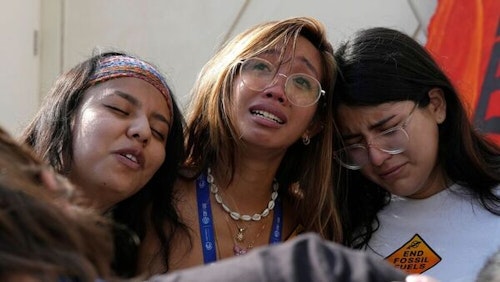
COP28 strikes ‘historic’ deal to transition away from fossil fuels: What are the key takeaways?
And with that, we’re wrapping up our coverage for today - and for our COP28 blogs. Thanks for following along, and stay tuned for more features and analysis on what the deal means, and what happens next.
The global stocktake - with its agreement to transition away from fossil fuels - is the headline outcome from COP28. But it didn’t mark the end of the summit, as all countries and parties then had the opportunity to speak.
There were other decisions to be adopted - and some agenda items that won’t be progressed at all this year, as CarbonBrief’s Dr Simon Evans notes.
I count at least 12 agenda items at #COP28 that got the dreaded "Rule 16" treatment – come back and try again next year – because no agreement could be reached
Is that a record?!https://t.co/NtOc6QPYfw pic.twitter.com/Wf1oqhHHa8
— Simon Evans (@DrSimEvans) December 13, 2023
"For the first time, the world is committing to a transition away from fossil fuels."
European Commission President Ursula von der Leyen has welcomed today’s COP28 agreement in a speech to the European Parliament. pic.twitter.com/rtIRtTwueV
— Euronews Green (@euronewsgreen) December 13, 2023
What's actually in the COP28 deal?
We covered some of it briefly earlier and you've probably got a sense that fossil fuel commitments are a pretty important part of this deal, but we haven't had a chance to look at the rest of the text that makes up this more than 20-page document.
The biggest point for many is the call for countries to transition away from fossil fuels - the first time reducing fossil fuel use has been explicitly mentioned in a COP text. It isn't the 'phase out' that many were asking for and has left some disappointed but it is a compromise that puts us on track for the beginning of the end of the fossil fuel era.
The text recognises that greenhouse gas emissions will peak but also that pathways developing and developed nations take to shift away from fossil fuels will be different. It also still includes references to carbon capture technology which some say could be an excuse to slow the transition to renewables.
Loss and damage was headline news at the beginning of COP28. Recognition that the finance currently being provided by richer countries for poorer nations to adapt to climate change and transition away from fossil fuels is not enough is in the text. There are no requirements, however, for rich nations to actually address this and wording that recognised human rights and Indigenous rights is gone.
Methane pledges were also big news and calls to reduce emissions were included in previous drafts. But the final deal does not set a tangible goal for curbing this potent greenhouse gas.
Nature has also become a firm part of this climate agreement. For the first time, the Global Biodiversity Framework and a reference to halting deforesting by 2030 are in there. Language has strengthened but a lack of implementation targets and finance could hold back progress.
And, as the last few orders of business are read off in Dubai, it is clear that a lot of technical decisions and documents aside from the Global Stocktake have been pushed off for now.
COP28 deal is 'not the finish line' - UN climate chief
Echoing the feelings of many following this rollercoaster of a COP, UN climate chief Simon Stiell has told reporters in Dubai he isn't sure what time of day or even what day it is right now. We're right there with you, Simon.
He said that many of the initiatives announced at COP28 are "climate action lifelines, not the finish line".
"What I’m focused on is seeing these pledges converted into outcomes in the real economy, where the rubber really hits the road on climate action."
Stiell also acknowledged the concerns from Samoa and the small island states.
"Island States made it clear from the floor that this consensus does not go far enough to protect their populations and the planet.
"The fact they received the longest standing applause is a clear indication these views are widely shared."
The UN climate chief said the deal leaves "a lot of room for interpretation".
"Loopholes leave us vulnerable to fossil fuel vested interests, which could crash our ability to protect people everywhere against rising climate impacts.
"Transparency and people holding their governments to account will be vital to closing these loopholes."
COP28 deal is an 'important milestone' - but its long overdue, says Al Gore
"The decision at COP28 to finally recognise that the climate crisis is, at its heart, a fossil fuel crisis is an important milestone," former US vice-president Al Gore has said.
"But it is also the bare minimum we need and is long overdue."
He said on X, formerly known as Twitter, that the influence of petrostates is still evident in the "half measures and loopholes" included in the final deal. But the "passionate work" of millions of climate activists from all over the world motivated many nations to "loosen the industry's grip".
"Whether this is a turning point that truly marks the beginning of the end of the fossil fuel era depends on the actions that come next and the mobilization of finance required to achieve them."
Gore says we have to ask ourselves how much longer the world can wait before we summon the political will to overcome these narrow special interests and act on behalf of the future of humanity.
"It is up to all of us to hold our leaders accountable to their promise to transition away from fossil fuels once and for all."
The decision at #COP28 to finally recognize that the climate crisis is, at its heart, a fossil fuel crisis is an important milestone. But it is also the bare minimum we need and is long overdue. The influence of petrostates is still evident in the half measures and loopholes…
— Al Gore (@algore) December 13, 2023
A 'leaky' agreement 'full of holes'
John Silk, head of the delegation for the Republic of Marshall Islands has called the agreement a "canoe with a weak and leaky hull, full of holes".
"Yet, we have to put it into the water because we have no other option. As we have said, king tides are eating away at our shores. Our wells are filling with saltwater. Our families are at risk."
Silk told the plenary that the intent to transition away from fossil fuels is progress that has been fought for for years, not just at this COP. Criticising the adoption of the agreement without representatives from small island states in the room he said, "I appreciate the effort that has gone into this outcome. But it has not been inclusive. The fact that the decision was gavelled without a major group in the room - which represents one of the most vulnerable groups in the world - is unacceptable."
Silk added that the Alliance Of Small Island States and the High Ambition Coalition, alongside many others, are to thank for consistently making the case for the phase out of fossil fuels, for championing the importance of adaptation and keeping 1.5C alive. "This is a small step in the right direction for this process. A good signal. But in the context of the real world - where temperatures are rising, and people are dying - it is not enough."In the year ahead I hope that islands are heard as we continue to call for a phase out of fossil fuels that is clear and complete. And so, as we sail this leaky canoe together, let’s agree to patch the leaks so we can keep the canoe afloat for the sake of all of us, especially the most vulnerable."
Jojo Mehta, co-founder and CEO of Stop Ecocide International (a global movement pushing for ecocide to become an international crime) has warned that we can't "jump from the frying pan into the fire".
"I fully understand the frustration expressed by the Alliance of Small Island States and others regarding the lack of ambition expressed in the COP28 deal agreed this morning. We’re not giving adequate weight to the concerns of those most vulnerable to the consequences of insufficient action."
Mehta says that it is a "shameful irony" that it is some of these same vulnerable countries that will "bear the brunt of the unchecked rush to extract so-called ‘transition minerals’ such as cobalt and lithium needed to fuel the proposed renewables boom."
"We cannot jump from the frying pan into the fire. We need an approach to navigating the challenging reality we all face that goes beyond simply focusing on carbon emissions or leaving the market to respond to the climate crisis restrained only by weak regulatory frameworks - often found in places where biodiversity is greatest.
"A new standalone crime of ecocide recognised by the International Criminal Court (ICC), where it belongs, alongside genocide, is essential if we are to have any hope of guiding ourselves safely through the turbulent years to come."
A more damning reaction than most comes from the Center for International Environmental Law (CIEL), which calls the summit “a fossil-fuelled failure”.
Here is Nikki Reisch, CIEL’s Director of Climate & Energy Program's verdict:
Countries at COP28 faced a choice between fossil fuels and life. And big polluters chose fossil fuels. Despite the unstoppable momentum and unequivocal science behind the need for a clear signal on the phaseout of oil, gas, and coal – free of loopholes or limitations – the text failed to deliver one.
Where was Samoa?
It took around a minute for COP28 President Sultan Al Jaber to open the plenary before banging down the gavel on the summit’s central outcome, the Global Stocktake.
The Alliance of Small Island States (AOSIS), led this year by Samoa, were not in the room. The islands which face some of the greatest existential threats from climate change, say they arrived back to standing ovation to a deal which does not do enough to secure their survival.
They were in an adjacent room when the plenary started, around 30 minutes late.
“We were working hard to coordinate the 39 small island developing states that are disproportionately affected by climate change, and so were delayed in coming here,” a statement from AOSIS reads.
But during this final session, AOSIS Chair Anne Rasmussen made her feelings clear. And received a longer standing ovation than the COP28 President got for announcing the adoption of the deal.
Tears flowed and a lengthy rousing ovation during final plenary just now for AOSIS Chair #AnneRasmussen, as she delivered an emotional response filled with unsparing observations about the final outcomes from #COP28UAE pic.twitter.com/YEt4sgIvB0
— AOSIS (@AOSISChair) December 13, 2023
International Renewable Energy Agency chief, Francesco La Camera has called the commitment to triple renewable energy and double energy efficiency by 2030 "monumental".
"This is critical and holds the key to our collective commitment to remain within the 1.5-degree threshold.
Aligned with what the science of the IPCC tells us, IRENA’s World Energy Transitions Outlook has been consistently calling for a tripling of the currently installed renewable capacity to over 11.000 GW by 2030, demanding a transition from today’s annual renewable deployment rate of 300 GW to an ambitious 1000 GW.
This task is monumental. Yet it is achievable.
We believe it is the most realistic course-correction to urgently accelerate the global energy transition away from fossil fuels, trigger systematic change and overcome the barriers stemming from fossil fuels."
Humanity has 'finally done what is long overdue', says EU climate chief
EU climate commissioner Wopke Hoekstra has welcomed the deal, thanking the COP28 president for his "vision and tremendous tenacity" alongside Simon Stiell's UN climate team.
"When we are long gone, our children will be there to deal with the things we have left for them. The good and the bad," he said.
"And with them in mind, it makes this a day of gratitude and of silent determination."
Hoekstra said that "humanity has finally done what is long overdue. Thirty years we've spent to arrive at the beginning of the end of fossil fuels."
Co-lead of the EU delegation and Spain's environment minister Teresa Ribera also spoke, acknowledging Samoa's objections: "climate justice still needs our engagement and our work".
She said that this "step forward" and "joint commitment" delivers "much more in a critical decade"
"We think this is a very relevant and positive step forward and we are very happy to take this step with all of you."
The world just adopted a historic decision at #COP28 to set in motion an irreversible, accelerated transition away from fossil fuels.
With that, we have achieved what we set out to do: keep 1.5 within reach and mark the beginning of the end of fossil fuels. pic.twitter.com/fXDWyVggUr
— Wopke Hoekstra (@WBHoekstra) December 13, 2023
Some reactions coming in on the deal. Ani Dasgupta, president and CEO of the World Resources Institute says that fossil fuels have "finally faced a reckoning at the UN climate negotiations after three decades of dodging the spotlight".
It's a consensus and the inclusion of language on fossil fuels for the first time ever is a step forward in the face of opposition from oil and gas producing countries. But the deal is not perfect.
The Alliance of Small Island States has said it has "a litany of loopholes" that could hold up progress on cutting emissions and don't address many of the concerns of climate-vulnerable nations. Developing countries still require billions in climate finance to help them make this transition away from fossil fuels. Vital wording on human rights and the need to respect Indigenous rights is missing in relation to climate finance.
But it does provide a sense that finally, we might be starting to see the "beginning of the end" for fossil fuels.
As the COP28 president told countries in Dubai, however, an agreement is only as good as how we implement it; "we are what we do, not what we say".
Text has a 'litany of loopholes', say small island states
Samoan lead negotiator Anne Rasmussen has also taken to the floor on behalf of the Alliance of Small Island States (AOSIS) saying they were not in the room when the text was agreed.
"We didn't want to interrupt the standing ovation but we are confused."
She says that the draft text has "many strong elements" but that the "course correction" needed has not been secured.
Samoa says the focus on energy systems is "disappointing", listing other objections to the text which it says has a "litany of loopholes" that are of major concern to AOSIS.
"It is not enough to reference the science and then ignore what the science is telling us to do."
Sultan Al Jaber has thanked the Samoan delegation for its comments and moved on with proceedings.
Deal is 'beginning of the end' for fossil fuels says UN climate chief
UN climate chief Simon Stiell has also taken to the stage after hugging COP28 president Sultan Al Jaber. He says we needed this COP to "send crystal clear signals on several fronts" with some "genuine strides forward".
He calls this outcome the "beginning of the end" for fossil fuels.
Stiell says that the world "must get on with the job of putting the Paris agreement to full work", emphasising the importance of the pledge to triple renewable energy by 2030 and for rich nations to provide funding for poorer nations.
"In early 2025, countries must deliver new NDCs (nationally determined contributions), it must bring us into alignment with a 1.5C world. We will keep working to improve the process," Stiell tells the room.
His final message is to ordinary people everywhere.
"Every one of you is making a difference, your voices and determination will be more important than ever. We are still in this race, we will be with you every step of the way."
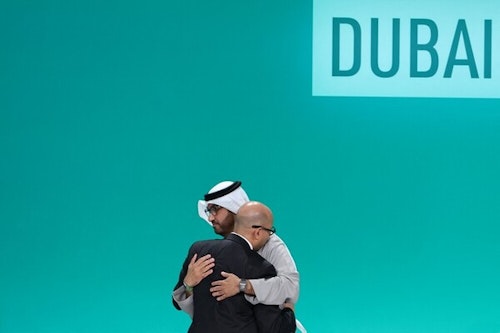
Al Jaber concludes with a standing ovation in the plenary:
"Future generations may not know your names but they will owe every single one of you a debt of gratitude. If it wasn't for your collective effort, we would not have been able to achieve this historic achievement. I thank you again."
What happens from here is already on the COP28 president's mind. He warns countries that "an agreement is only as good as its implementation".
"We are what we do, not what we say. We must turn this agreement into tangible action. If we unite, we can have a profound effect on all of our futures. Inclusivity kept us going in the difficult days. Everyone has been heard, from Indigenous peoples or youth to Global South."
Fossil fuels in a COP agreement for the 'first time ever'
Speaking to the room after the deal was agreed, Al Jaber says this is a historic moment.
“It is built on common ground, it is strengthened by full inclusivity. It is enhanced, balanced but make no mistake, a historic package.”
“For the first time, to deliver on methane and emissions. We have language on fossil fuels in our final agreement for the first time ever," he says.
Before telling the plenary that the deal had been approved, the COP28 president said that negotiators worked through the night to reach consensus.
"The presidency listened, engaged and guided," he said. "I promised I would roll up my sleeves. I promised I would be with you."
"You did step up, you showed flexibility, you put common interest ahead of self-interest."
Just like that with no objections, a bang of the gavel and cheers from the crowd, Sultan Al Jaber tells the room that the deal has been approved.
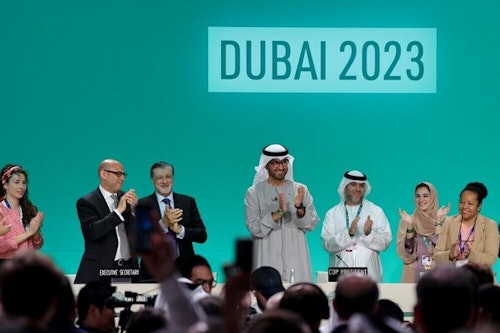
COP28 President Sultan Al Jaber has started the plenary, here we go.
Country representatives have been called to what the COP28 Presidency hopes is a final meeting this morning. They could pass the deal and end two weeks of tough negotiations or there may be more debate.
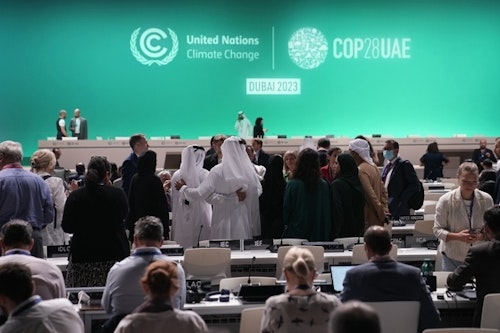
It's already late to start with some key representatives - like UK minister Graham Stuart who left Dubai yesterday to return briefly to London - only just making it into the room.
A reminder before we properly begin that deals struck at UN climate conferences have to be passed by consensus.
As they entered the plenary, country representatives were met by activists telling them to "hold the line" and bring an end to fossil fuels.
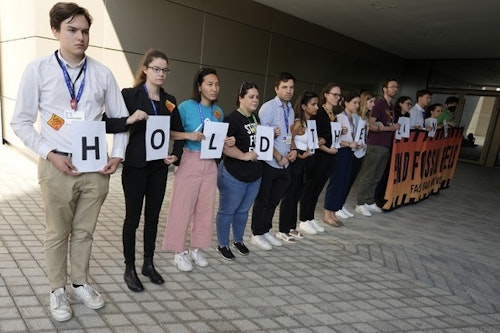
With countries now going into a plenary on the new draft text, Fernanda Carvalho WWF's global climate and energy policy lead says it is a "sorely needed improvement" from the previous version that caused outrage.
"The language on fossil fuels is much better but still falls short of calling for the full phase out of coal, oil and gas. Unfortunately, the draft also includes dangerous distractions such as transitional fuels, nuclear and carbon capture and storage listed as zero and low-emission technologies.
"The text calls on all countries to be guided by IPCC climate science and the aim of limiting global warming to 1.5C, but the guidance is not fully aligned with this aim. For a liveable planet we need a full phase out of all fossil fuels and the transition to a renewable energy future."
Carvalho says countries are now moving towards a text that would represent a "significant moment".
"For decades UN climate talks have failed to address fuels driving the climate crisis. This can mark the beginning of a new era of the climate regime.
"The ambition of the Global Stocktake outcome will define the legacy of COP28. Countries must use these final hours to push for an even more ambitious text that is fully aligned with preventing the most devastating consequences of the climate crisis.”
New text addresses 'elephant in the room' head on - Norway
The draft text has got a positive reaction from Norway's climate minister, Espen Barth Eide:
"It is the first time that the world unites around such a clear text on the need to transition away from fossil fuels. It has been the elephant in the room. At last we address it head on."
Okay so we've given you some reactions, but what does the text actually say? Here's how that much debated section on fossil fuels reads now:
“Transitioning away from fossil fuels in energy systems, in a just orderly and equitable manner, accelerating action in this critical decade, so as to achieve net zero by 2050 in keeping with the science.”
That word that many were hung up on, "could" is gone, replaced with "calling on countries to contribute".
But so is language that recognised global emissions must peak by 2025 to limit global warming to 1.5C. The new draft text just says that it recognises scientific modelling says emissions are projected to peak by 2025.
Some are saying it's a step forward, others are still concerned that vague language leaves a lot of wiggle room.
Some more thoughts on the new draft text from Tom Evans, policy advisor at think tank E3G:
“If this text is adopted in plenary later, it will show a collective recognition that we must turn away from fossil fuels and move towards a cleaner future. Champions for this vision - both small island states and major economies - have worked tirelessly overnight.
"However, it is clear that not everyone is ready to admit the truth of what’s needed. This text alone might help avoid disaster in Dubai but it does not avoid disaster for the planet.”
A positive take from Melanie Robinson, global climate programme director at the World Resources Institute:
“This text makes a clear call for the world to transition away from fossil fuels and accelerate action this decade. This would dramatically move the needle in the fight against climate change and overcome immense pressure from oil and gas interests.”
Good morning, we're back and we have a new draft text first thing today - with mixed reactions.
We'll go through the details shortly but the topline is that text does call for countries to transition away from fossil fuels. Though phase out or phase down language still isn't in there, it's definitely stronger than the last version.
It is early in Dubai, people are still reading over the new draft text and there's a lot of uncertainty about whether it's enough of a compromise for all countries to back it. So we'll bring you analysis as it comes in.










